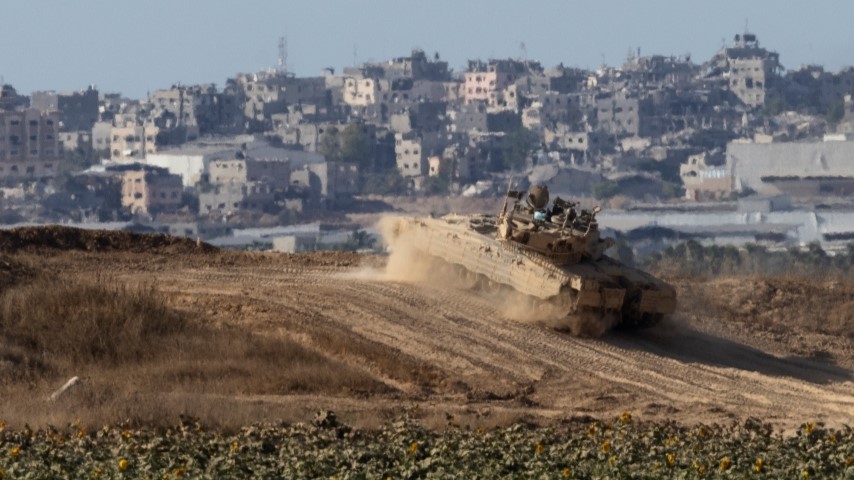An Interview with a Gazan Displaced by Israel’s Genocide
Photo by Amir Levy/Getty Images
As the genocide in Gaza inches closer towards the one year mark, the struggle for survival continues for Palestinian families besieged under constant Israeli bombardment. The unfolding horrors have aroused global protest, including the self-immolation of three Americans, the latest being Matt Nelson, who set himself on fire outside the Israeli consulate in Boston. Despite events like these and polls indicating most Americans oppose providing weapons to Israel, nothing has shaken the Biden administration’s commitment to advancing Israel’s ethnic cleansing of the Gaza Strip.
Matt Nelson, like Aaron Bushnell before him, rose as a martyr from the depths of the unmoored colonial world—first as an unwilling instrument of its interests, then as a self-sacrifice against it. Today, as Israel continues to widen its campaign of terror across Gaza, Palestinians are straining to find the most basic amenities on a day-to-day basis in the midst of an unyielding project of extermination.
In September, a 649-page document published by Gaza’s Health Ministry chronicled the identities of Palestinians killed by Israel since October: the first 200 pages were the names of children, with the first 14 pages registering those under one year old. The oldest victim of Israel’s current genocidal campaign was 101 years old, “older than the state itself.” In one incident, a fetus, still attached to its mother’s womb, was killed by an Israeli airstrike that also killed his mother. The airstrike also killed 21 people who had been sheltering in a school in the neighborhood of Al-Zeitoun. Israel’s objective in Gaza is mass slaughter, as evidenced by its targeting of ambulances, medical infrastructures, police stations, UNRWA facilities, universities, journalists, and even the tents of Palestinians left homeless by Israel’s extermination campaign.
Samer Osama, a 27-year-old civil engineer in Gaza, tells Splinter that his family, originally from Beit Hanoun, a town located in the north-eastern part of the Strip, has never left Gaza and has never known life outside its borders. “I’ve never left Gaza, and I’ve only seen Palestine in pictures and heard about it from our elders and grandparents who spoke about how beautiful Palestine is. All this beauty was taken from us by force.”
Samer’s attachment to Palestine was so strong that before his eldest daughter Naya was born, he considered naming her after cities like Jaffa, Beisan, Jerusalem, “or even just Palestine.” Samer, like all Palestinians across Gaza, has not been spared from Israel’s violence. While charging his phone, his 9-year-old cousin Ahmad was killed inside a house he had taken refuge in. “Just like that, with no reason,” Samer says. A day after Ahmad’s death, his grandmother died of a heart attack. “She died from grief, and because there is no healthcare available, as all the hospitals have been destroyed, and as there is no electricity or fuel to keep them operational.”
During the first months of the current genocide in Gaza, Samer emphasizes that there were many goods available, and at affordable prices, but as the war continued and the borders closed supplies and essentials soon ran out. “Getting supplies became possible only through UNRWA aid, which came once or twice a week. Of course, it wasn’t enough, but we rationed our food. Then flour ran out, and its price skyrocketed to $300 in the southern regions and $1,000 in the north. By then, I had exhausted the money I’d saved from my previous freelance work online.”
While at first, Samer didn’t want to launch an online fundraiser for his family, assuming the genocide wouldn’t last this long, he decided to start a campaign to help them survive. “Every person in Gaza has lost at least 25 kilos. For long periods during this war, we only ate canned goods like beans and peas. Of course, vegetables were not affordable, and neither were meat or chicken. When I received financial support from donors and meat became available, I bought some. We need healthy food to regain our strength. We can no longer move like before. Carrying water buckets and containers has taken a toll on us, and we feel extreme fatigue. So, meals like meat and chicken were a lifeline for us and essential for our children’s healthy growth.”
Samer emphasizes that there is still a sense of hope, despite how often it is intermingled with despair. “The occupation is about destruction, killing, and burning. But we Palestinians, especially in Gaza, and I as a Palestinian civil engineer, have a duty to rebuild and revive hope on this barren land. We have watered it with our blood and sweat. We will certainly not give up on rebuilding it, even thousands of times. We were born here, and we will die here.”